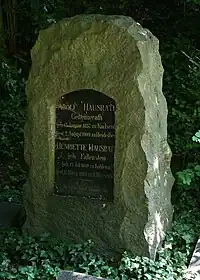Adolph Hausrath
Adolf Hausrath (13 January 1837 – 2 August 1909), a German theologian, was born at Karlsruhe.
Biography
He was educated at Jena, Göttingen, Berlin and Heidelberg, where he became Privatdozent in 1861, professor extraordinary in 1867 and ordinary professor in 1872. He was a disciple of the Tübingen school and a strong Protestant. His scholarship was sound and his style vigorous.[1]
Hausrath died on 3 August 1909[1] in Heidelberg.[2]
Works
Among other works he wrote Der Apostel Paulus (1865), Neutestamentliche Zeitgeschichte (1868–1873, 4 vols; Eng. trans.), D. F. Strauss und die Theologie seiner Zeit (1876-1878, 2 vols), and lives of Richard Rothe (2 vols, 1902), and Luther (1904).[1]

Under the pseudonym George Taylor he wrote several historical romances, especially Antinous (1880), which quickly ran through five editions, and is the story of a soul "which courted death because the objective restraints of faith had been lost." Klytia (1883) was a 16th-century story, Samen (1884) a fictional work of 19th century Germany, Jetta (1885) a tale of the great immigrations, and Elfriede "a romance of the Rhine".[1]
Notes
- Chisholm 1911.
- Hausrath, Adolf (Pseudonym George Taylor) In: Neue Deutsche Biographie (NDB). Band 8, Duncker & Humblot, Berlin 1969, ISBN 3-428-00189-3, S. 126 f.
References
- This article incorporates text from a publication now in the public domain: Chisholm, Hugh, ed. (1911). "Hausrath, Adolph". Encyclopædia Britannica. Vol. 13 (11th ed.). Cambridge University Press. p. 71.
External links
 Media related to Adolf Hausrath at Wikimedia Commons
Media related to Adolf Hausrath at Wikimedia Commons- Works by Adolf Hausrath at Project Gutenberg